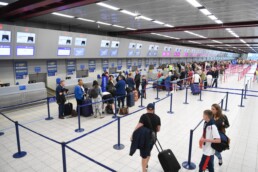How Niche Travel Markets Are Thriving And What You Can Learn From Them
As travel has become more difficult to understand during the current crisis we are in, there are many travel niches that have proved to be the saviors of consumers. People will always have a desire to travel and continually are looking for the safest way to get out and enjoy themselves. Jeff Gayduk sits down with four industry insiders that each have their own foot in a niche travel market and explains how they have been continuing business as well as what has changed.Â
Nancy Schretter
Nancy Schretter is the founder and president of The Beacon Group, whose goals and market is travel, but more specifically family oriented trips along with groups. During the current crisis we are in, it has become increasingly frowned upon and harder to be going on vacations as it is a huge risk. But a big trend Schretter is seeing is the rise of road trips, especially within families in order to create a bubble to where they will ensure their safety. Options such as national parks, camping, RV trips, AirBnbs, and ranches have risen rapidly in popularity. Another key point is that it is not too late to book trips for upcoming holidays, there are still a lot of hot deals for travel and it's always good to plan ahead of time.
Keith Snode
Keith Snode is the COO of Kaleidoscope Adventures, a company that focuses on middle to high school students and getting trips planned through the school. In terms of how trips are being planned during COVID-19, they essentially are not according to Snode. It has become increasingly difficult to get trips approved by school boards, and Snode is on the side of not focusing on extracurricular trips and rather putting all the focus on just getting schools open. Kaleidoscope has started putting more of their focus on groups they know they can work with, such as the homeschool community, groups within the school and the schools that are smaller such as drama clubs, bands, and art clubs. As well as groups outside of school like youth and church groups that may be looking to go on local trips. This is due to there being no school board in which a trip would have to be approved through. Overall, Snode and his team are hopeful for the future and looking at all their options to get up and running again.
Alexander Gloss
Alexander Gloss is the CEO of China i2i Group which is based in Shanghai China. Being located in Shanghai has allowed Alexander to have a really unique insight and viewpoint on the travel industry and the entire COVID-19 crisis. Being able to hear and understand how China is doing relative to North America gives other companies an upper hand and what to expect or change. At the moment there is no international travel going on in China, yet domestic travel has exploded. This was due to cheap deals, and airlines giving almost free tickets to those looking to travel. Business in China for Alexander and China i2i has gone essentially back to normal, because of this Gloss says, there is hope for other countries and to just look to the future.
Jason Clement
Jason Clement is the founder and CEO of The Sports Facilities Management which has created a network of helping clients achieve whatever goals they set related to sports facilities. Focusing both on the youth and amateur markets of sports. The Sports Facilities Management has 20 facilities across 16 states, which has had its own problems for Clement. Due to regulations being different from state to state, Clement is having to work around 16 different governors guidelines and creating strategies that work for each state. Sports have had a large impact on the traveling market with many sports teams starting their seasons and fans as well as players looking to start up again. National events have proved to be much harder for Clement to kick start, but local outdoor events have been affirming that things are going to work out.
Things you Must-Do To Stay In Communication
Communication has been in the spotlight now more than ever with businesses coming up with innovative ways to communicate with their customers. Noreen Heron president of Heron Agency, Janet Isabelli founder of Isabelli Partners, Dakota Shultz co-founder of Agency 360, and Carol Fox president of Carol Fox and Associates came together to discuss their must-do things to communicate better to their customers in current times.
- Talk Directly to Customers
This may sound obvious but many businesses are not actively speaking directly with their customers. Posting on socials may let customers know about your business and the regulatory steps you are taking to keep them safe, but it is not enough. “I'm seeing a lot of signs and posters about safety precautions, but that takes the human aspect out of the business, use the voice of your employees to be more personal†says Dakota Shultz. Being intimate with customers gives them comfort. Customers are already uncomfortable with eating indoors, let them know what you're doing personally to make their experience the best it can be.Â
2. Know How to Communicate Safety Vs. the Experience
An issue many businesses are facing is trying to balance marketing their safety regulations and the experience. What's the right amount of balance between the two? Isabelli believes a 50/50 balance is key, showing your customers that you aren't putting safety to the side by giving it the same amount of attention you would the experience. While Heron thinks 60/40 is more in line with what people want, most customers are used to the guidelines now and at this point just want to focus on having a good time than worrying about the regulations stating “We are here to help youâ€.
 3. How to Plan For The FutureÂ
Many businesses are focusing on what to do in the future rather than worrying about re-opening or staying open right now if they are not able to. This is the wrong way to go about it because there is so much uncertainty on when and if things will go back to “normalâ€. Fox believes there is always a way to continue to bring content to customers stating “Try and do online shows rather than waiting and hopingâ€. The best way to figure out how to remain operating is simply ask the customers what makes them comfortable “take surveys instead of trying to assume what they want '' says Shultz. Being upfront can be one of the most powerful tools when trying to figure out what customers want, especially during such complicated times.
Your Production Guide To Going Online
Knowing how to move and execute an online or virtual event is becoming the new frontier, it's unknown and is constantly changing within a small period of time. Sean Denny, director of event, and production designer at LUXE productions has had plenty of experience with virtual production. Leading the charge in finding the most innovative way and techniques to keep viewers engaged, involved, and wanting more.
Denny defines the difference between a virtual event and a hybrid event. A virtual event being that “no one is gathered together†versus a hybrid event which involves a live crowd that is then being live streamed to others.
An important aspect about virtual events is that they “offer the least amount of options and least production valueâ€. Were all used to putting a silly virtual background in our zoom meeting, but that level of production is no longer sustainable.
Hybrid events have shown in the past to be the most powerful type of online event because of the fact it allows for a much higher production value. The downfall of this is that it can take weeks or months to plan out and get ready.
Deciding which of these two are better requires businesses to look at multiple factors. Those being current regulations, will local or international guests be attending? Is the content time sensitive? What is your budget? These four factors are how a business can strategically decide what type of event to host.
But, what is next? Everyone is sick of zoom calls and it has quickly become the standard way to communicate since COVID-19 has impacted our society. The zoom trend is already dying out and is becoming a “boring†tool when trying to engage an audience for an online event.
Jamie Grossman, president of Luxe Productions gives his thoughts on what new trends will start to be implemented moving forward. The first being augmented reality, utilizing the ability to build any kind of environment in order to engage the audience for longer. The downfall to using high quality technology to increase engagement is it has to be used correctly to be successful. “It doesn't matter how expensive the equipment used to capture an event or presentation is, if the content is not interesting it is not going to capture your audience†says Denny. Watching a computer screen rather than being there at the event is entirely different, the attention span of the viewer is significantly smaller. The solution to this Grossman says is “45 minutes tops†for a singular event to run.



